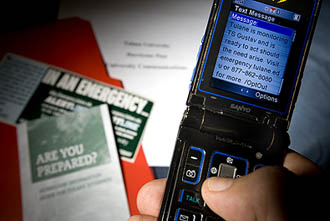Storm Communications Good to Go
With Hurricane Gustav looking as if it will enter the Gulf of Mexico this week, now is the time for members of the Tulane community to refine and dial-in their emergency response plans. Even though predicting the ultimate path of a hurricane is like playing meteorological roulette, the university administration wants students, faculty and staff to be aware of the systems put in place to keep them in the know, and make sure their plans are in place.

A system allows the university to broadcast 400,000 messages within 30 minutes to the entire Tulane community students, faculty and staff in one “blast.” (Photo by Paula Burch-Celentano)
“Although it is still too early to tell if this storm will pose any threat to the New Orleans area, the storm does serve as a reminder for all of us to be prepared to act if necessary,” says Anne Banos, vice president and chief of staff.
In addition to the emergency website, the university has a system in place for rapid dissemination of critical information by voice messaging sent to telephones and text messages sent to mobile phones.
The system allows the university to broadcast 400,000 messages within 30 minutes to the entire Tulane community students, faculty, staff in one “blast” when directed by Debbie Grant, vice president of university communications, whose office is responsible for emergency communications.
When students confirmed their classes on the registrar's TOUR system, they were asked to provide a cell phone number to be used in an emergency. If they did not put in their current cell number, students are urged to do so. Faculty and staff members must go to the emergency website and make sure their contact information is up-to-date, especially their cell phone number. The latest emergency information also is available by calling the Tulane AlertLine at 504-862-8080 or 877-862-8080.
If the emergency alert message calling for mandatory evacuation is sent out to the university community, each individual should implement his or her evacuation plan. Now is the time to be sure a plan is prepared.
“The most important thing is to have an evacuation plan in place,” says Greg Southworth, Tulane's emergency response director. “Don't rely on the university or the state and federal government to take care of you.”
While he urges all students to have their own plans, Southworth makes it clear that the university will do everything it can to safeguard the well-being of students.
“We will not leave any students behind. For those students who don't have a way to evacuate, we have a procedure in place. We have busses on contract so we can get students to Jackson State University, in Jackson, Miss. But it should be an option of last resort.”
Tulane's Office of Emergency Preparedness website has hurricane procedures for students, faculty and staff, as well as useful links to disaster resources.
